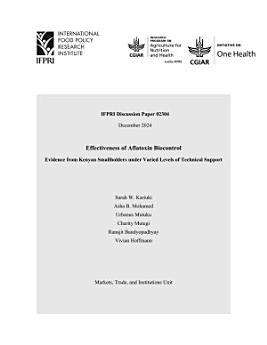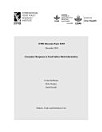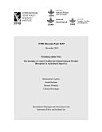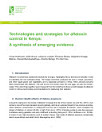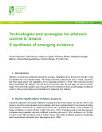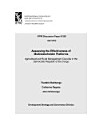Effectiveness of aflatoxin biocontrol: Evidence from Kenyan smallholders under varied levels of technical support
Kariuki, Sarah W. · Mohamed, Asha B. · Mutuku, Urbanus · Mutegi, Charity · Bandyopadhyay, Ranajit · Hoffmann, Vivian
ene 2025 · IFPRI Discussion Papers Libro 2304 · Intl Food Policy Res Inst
eBook
37
Páginas
family_home
Apto
info
reportLas valoraciones y las reseñas no se verifican. Más información
Información sobre este eBook
Agricultural technologies shown to be highly effective in research trials often have a lower impact when utilized by smallholder farmers. Both heterogeneous returns and suboptimal application are believed to play a role in this efficacy gap. We provide experimental evidence on the impact of a biocontrol product for the control of aflatoxin, a carcinogenic fungal byproduct, as applied by smallholder farmers in Kenya. By varying the level of external support across farmers, we investigate the role of misapplication in the effectiveness gap. We find that the provision of biocontrol together with a one-time training on application reduces aflatoxin contamination in maize relative to a control group by 34 percent. Additional training to the farmers in the form of a call to remind them of the correct time of application in the crop cycle increases the reduction to 52 percent. Our findings indicate that farmers can achieve meaningful improvements in food safety using biocontrol even with minimal training on its use and that additional support at the recommended time of application can strengthen its impact.
Valorar este eBook
Danos tu opinión.
Información sobre cómo leer
Smartphones y tablets
Instala la aplicación Google Play Libros para Android y iPad/iPhone. Se sincroniza automáticamente con tu cuenta y te permite leer contenido online o sin conexión estés donde estés.
Ordenadores portátiles y de escritorio
Puedes usar el navegador web del ordenador para escuchar audiolibros que hayas comprado en Google Play.
eReaders y otros dispositivos
Para leer en dispositivos de tinta electrónica, como los lectores de libros electrónicos de Kobo, es necesario descargar un archivo y transferirlo al dispositivo. Sigue las instrucciones detalladas del Centro de Ayuda para transferir archivos a lectores de libros electrónicos compatibles.
